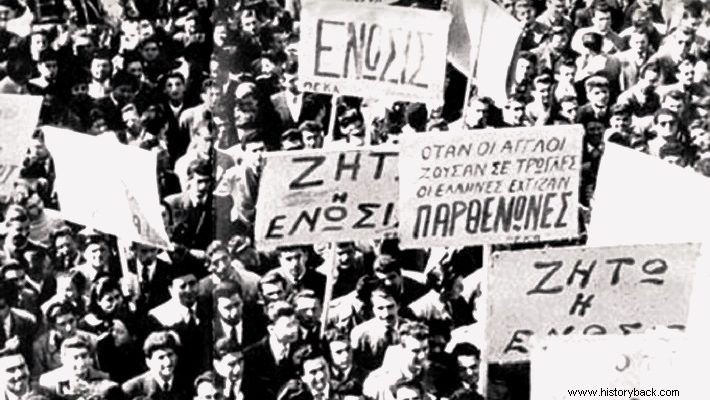
The Greek governments, before Papagos, did not dare to claim Cyprus. Only in 1941 the then King George had asked the British for the concession of Cyprus, but to no avail. The Plastira government also did not move the Cyprus issue, succumbing to the pressures brought to bear on it.
In Greece, the elections of November 16, 1952 brought to power the "Greek Alarm" of Papagos, who achieved a great victory and, thanks also to the electoral system, received 240 seats in the Parliament. But Papagos committed a fatal mistake.
Contrary to his predecessors, he not only supported the Cypriots, but actually strengthened their decision for an armed struggle, by EOKA, after first (December 22, 1952) he tried to negotiate with the British, without success. He even brought the Cyprus issue to the UN (September 16, 1954). This move of his of course brought him into conflict with the British and the Americans.
On 1 April 1955 EOKA began the campaign with a series of bombing raids against British targets. However, to his surprise, Grivas heard, that same night, from the Greek - state radio at the time - talk about "terrorist attacks" in Cyprus!
In his letter to Makarios, Grivas stated:"I am obliged to come back to the issue of the content of the broadcasts of "Voice of the Fatherland" (broadcast of the Athens radio station). Today's broadcast was worse than yesterday. He even went so far as to say that Freedom is not gained by terrorism, just as Gandhi did not achieve the liberation of India by such means. Those who watched with me were petrified and wondered if they should continue the fight!
After all, our "allies" remembered our long-time rival, Turkey. On September 6, 1955, the Turkish mob unleashed an unprecedented pogrom against the Greeks of Constantinople. Regarding the Cyprus issue, Papagos had also disagreed with his closest associate Spyros Markezini.
Greece did not react, since Papagos fell ill and died on October 4, 1955 . "Rizospastis" reports:"On October 4, 1955, Papagos died. Much has been written about the circumstances of his death. Hypotheses were also expressed in the press, that he might have been murdered by the British, due to his disagreements regarding the policy of Great Britain in the Cyprus issue. Papagos had been in favor of appealing to the UN for Cyprus, which he carried out, a fact that Great Britain was opposed to. However, specific elements did not see the light of day...
Papagou - British relations had been strained since 1941 and, like Metaxas, the marshal managed to become very annoying to Britain, which was still trying to emerge as a great power in the Mediterranean - attempting in 1956 and the attack on Suez.
Papago's death relieved the Americans and British of an obstacle. His successor, Konstantinos Karamanlis, appeared to be much more adaptable to the Cyprus problem, also based on the Pipinelis memorandum.
